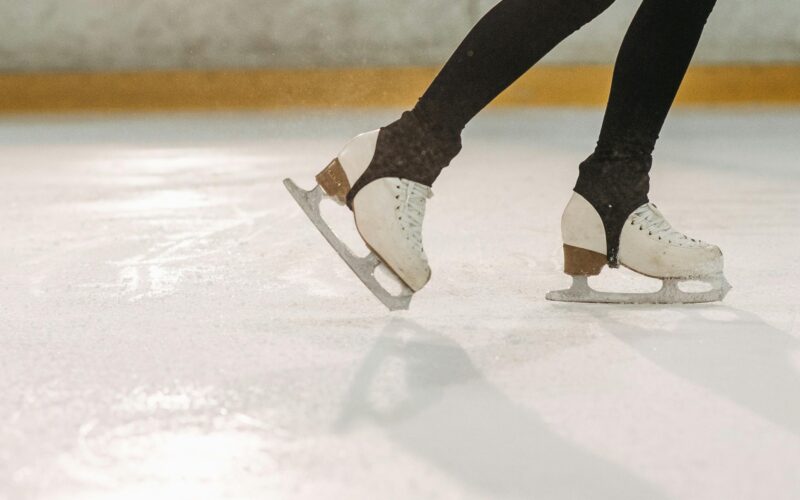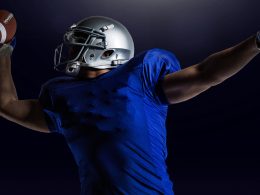After earning a Gold Medal for Team USA at the 2022 Winter Olympic Games, the figure skating pair team of Alexa Knierim and Brandon Frazier could not have been more shocked when they were served with a copyright infringement lawsuit over their short program music.1[1]See Complaint, Twelve Sixty LLC v. Comcast Corp., No. 8:22-cv-00255 (C.D.Cal. Feb. 16 2022) (“Complaint”). In that program, they used a 2015 cover of a folk rock song.2[2]See Blake Brittain, Olympic Skaters and NBC Settle with Musicians Over Song Use, REUTERS (July 22, 2022), https://www.reuters.com/legal/litigation/olympic-skaters-nbc-settle-with-musicians-over-song-use-2022-07-22/. The lawsuit shook up the skating world, which had not previously concerned itself with licensing music for competitions. That’s because, prior to 2014, skaters were not allowed to use music with lyrics in figure skating programs.3[3]See ISU Comm. No. 1863 Agenda of the 55th Ordinary Congress Dublin-2014, Proposals 260, 264, 271, 278, INTERNATIONAL SKATING UNION (Apr. 9, 2025), https://isu-d8g8b4b7ece7aphs.a03.azurefd.net/isuproduction/uploads/images/isucongress/otherdocuments/lgj1l0v7jkee5ooyvgzkb9wjbwrzsmo8z7sv62n8v46hoygzpj.pdf. Accordingly, for national and international competitions, most skaters used instrumental music that was already in the public domain.4[4]See Rozanne Els, 11 Things You Should Know About Olympic Figure-Skating Music, VULTURE (Feb. 20, 2018), https://www.vulture.com/2018/02/2018-olympic-figure-skating-music-explainer.html. This article explores the skating world’s response to the infringement lawsuit, including whether program music should be protected by the fair use doctrine, and what measures should be taken going forward to ensure copyright compliance when choosing program music.
Music in Figure Skating
Figure skaters used to be known for their classical programs by composers such as Tchaikovsky and Beethoven.5[5]See Id. Throughout most of figure skating history, legal concerns over music rights didn’t exist because most classical music is in the public domain and did not require licensing for performance use.6[6]See Music Resources, Univ. of Hous. Librs. (Feb. 10, 2025), https://guides.lib.uh.edu/music/musiccopyright#:~:text=Public%20Domain%20refers%20to%20works,protected%20separately%20from%20musical%20compositions.
This changed in 2014 when the International Skating Union (“ISU”), the international federation that governs figure skating, began allowing lyrics in competition music for singles and pair skating.7[7]“Ice dancing has allowed music with lyrics since the 1997-1998 season.” Els, 11 Things You Should Know. Since then, skaters have eagerly embraced this rule change, which led to a steep rise in the use of contemporary music. Skaters are now skating to pop songs like “Turn Down For What” by DJ Snake and Lil Jon8[8]U.S. skater Jimmy Ma skated to “Turn Down For What” by DJ Snake and Lil Jon during the 2017-2018 season. Wandera Hussein, Figure Skater Chooses DJ Snake & Lil Jon’s ‘Turn Down For What’ for Performance, BILLBOARD (Jan. 5, 2018), https://www.billboard.com/music/music-news/dj-snake-lil-jon-turn-down-for-what-figure-skating-performance-8092866/. or the Mamma Mia soundtrack.9[9]Australian ice dancers Holly Harris and Jason Chan skated to a mix of Abba songs from the Mamma Mia soundtrack for their rhythm dance during the 2024-2025 season. Holly Harris and Jason Chan Biographies, ISU https://www.isuresults.com/bios/isufs00108245.htm (Apr. 25, 2025). At the 2022 Olympics in Beijing, China, U.S. pair skaters Alexa Knierim and Brandon Frazier performed their short program to a cover of “House of the Rising Sun” (the “song”) by indie pop band, the Heavy Young Heathens.10[10]U.S. Figure Skating’s website has since removed the name of their short program music for the 2021-2022 season. Such information can be still found through various legal resources discussing the lawsuit. See Brittain, Olympic Skaters and NBC Settle. Their extraordinary performance earned them a standing ovation and an Olympic Gold in the Figure Skating Team Event.11[11]See Beijing 2022 Figure Skating Team Event Results, OLYMPICS.COM, https://www.olympics.com/en/olympic-games/beijing-2022/results/figure-skating/team-event (Apr. 25, 2025). However, unlike classical music, contemporary music can require licensing of public performance rights. Knierim and Frazier had not secured those rights, precipitating a copyright infringement lawsuit.
Copyright Infringement or Fair Use?
Shortly after the Olympic Games, Heavy Young Heathens brought suit in California court accusing Knierim and Frazier, Comcast Corporation, NBC Universal Media LLC, USA Network, Peacock, and United States Figure Skating Association (“defendants”) of copyright infringement.12[12]See Complaint. In their complaint, captioned Twelve Sixty LLC v. Comcast Corporation, Heavy Young Heathens and their record label Twelve Sixty (“plaintiffs”) sought an injunction and sought to obtain redress for “[d]efendants’ blatant and purposeful infringement of Plaintiff’s copyright.”13[13]Complaint ¶1. See 17 U.S.C. §§ 106(6), 501, and 504. Plaintiffs alleged that such infringement caused an “enormous and irreparable harm” and that defendants “may not continue to exploit plaintiffs’ musical composition in order to broadcast and promote their products to the public without plaintiffs’ authorization.”14[14]Complaint ¶ 7. The lawsuit eventually settled for an “undisclosed sum suggested to be in the millions.”15[15]Talia Barrington, Gymnasts, Figure Skaters, and Other Artistic Athletes Are Up Against an Unlikely Foe, SLATE (Nov. 30, 2024) https://slate.com/business/2024/11/figure-skating-music-copyright-infringement-gymnastics-artistic-olympic-sports.html; Brittain, Olympic Skaters and NBC Settle. But could defendants have argued that skating to that music was a non-infringing “fair use”?
The fair use doctrine calls for a “case-by-case analysis” and is “an open-ended and context-sensitive inquiry.”16[16]Campbell v. Acuff-Rose Music, Inc., 510 U.S. 569, 577 (1994) (citing Harper & Row Publishers, Inc. v. Nation Enters., 471 U.S. 539, 560 (1985)); Cariou v. Prince, 714 F. 3d 694, 705 (9th Cir. 2013) (citing Campbell, 510 U.S. at 577-79; Blanch v. Koons, 467 F.3d 244, 251 (2d Cir. 2006)). It states that “the fair use of a copyrighted work, including such use by reproduction in copies . . . for purposes such as criticism, comment, news reporting, teaching [], scholarship, or research, is not an infringement of copyright.”17[17]17 U.S.C. § 107. Fair use factors to consider include:
(1) the purpose and character of the use, including whether such use is of a commercial nature or is for nonprofit educational purposes;
(2) the nature of the copyrighted work;
(3) the amount and substantiality of the portion used in relation to the copyrighted work as a whole; and
(4) the effect of the use upon the potential market for or value of the copyrighted work.18[18]Id.
For the first factor, purpose and character, courts evaluate whether the new work “adds something new, with a further purpose or different character, altering the first with new expression, meaning, or message; it asks, in other words, whether and to what extent the new work is ‘transformative.’”19[19]Campbell, 510 U.S. at 579 (quoting Pierre Leval, Toward a Fair Use Standard, 103 HARV.L.REV. 1105, 1111 (1990). Here, defendants could argue that their use of the song was transformative because the skaters’ performance incorporated remixed music and adapted it into a new artistic form. In skating, skaters are judged and ranked for their speed, technicality, strength, execution, and artistry. A pair skating program has a variety of technical elements including jumps, throw, lifts, spins, step sequences, and artistic elements such as costumes, makeup, storytelling, and choreography. Music is only one part of the performance. Thus, incorporating the song with many other technical and artistic elements transformed it into an entirely new creation. In addition, defendants could argue that the use was not commercial because skaters do not make money performing and competing.20[20]Figure skaters do not get paid for competing “[e]xcept for small amounts of prize money for the elite few who rise to the top.” Barrington, Gymnasts, Figure Skaters, and Other Artistic Athletes. Instead, skaters primarily receive funding from family support and working part-time jobs to support themselves. Only an elite minority of skaters receive financial support from their national Olympic committee, or cash bonuses for winning medals, or compensation through sponsorship and endorsement deals.
Plaintiffs might respond that the appropriate standard is to evaluate “how the work in question appears to the reasonable observer, not simply what an artist might say about a particular piece or body of work.”21[21]Cariou, 714 F.3d at 707. Plaintiffs might argue that a reasonable observer would not notice the rearrangement of the music due to its similarity to the original track, so the song itself has not actually been transformed. Plaintiffs might also argue that the potential for skaters to attract sponsorship deals makes their use a commercial use. The Supreme Court has held that the “commercial nature of a use is relevant, but not dispositive” and must be “weighed against the degree to which the use has a further purpose or different character.”22[22]Andy Warhol Found. for the Visual Arts, Inc. v. Goldsmith, 598 U.S. 508, 510 (2023). Here, the skaters won an Olympic Gold Medal and prize money, so the commercial nature likely outweighs or is at least equal to the degree of creative purpose.
The second factor, nature of the work, considers “the extent to which it is creative and whether it is unpublished.”23[23]McGucken v. Pub Ocean Ltd., 42 F.4th 1149, 1161 (9th Cir. 2022) (quoting Monge v. Maya Mags. Inc., 688 F.3d 1164, 1177 (9th Cir. 2012)). Similar to the first factor analysis, defendants could argue that the entire performance was creative by combining choreography of technical elements and artistic elements. However, plaintiffs might point out that the Olympics Figure Skating Channel broadcast and published videos of the performance online on YouTube.24[24]Alexa Knierim and Brandon Frazier’s Skate Performance to House of The Rising Sun, YOUTUBE https://www.youtube.com/watch?v=59IgRB-zQCo (Apr. 25, 2025). Such publications would weaken the fair use defense.
The third factor asks if “‘the quantity and value of the materials used’ are reasonable in relation to the purpose of the copying.”25[25]Campbell, 510 U.S. at 686 (quoting Folsom v. Marsh, 9 F.Cas. 342, 348 (C.C.D. Mass. 1841)). For instance, courts have held that a “seven-second clip” used in a musical was “quantitatively insignificant”26[26]SOFA Ent., Inc. v. Dodger Prods., Inc., 709 F.3d 1273, 1279 (9th Cir. 2013). and constituted fair use. However, thirty seconds of a four-minute video could be considered substantial if it captures the “most valuable part of th[e] footage” and not constitute fair use.27[27]L.A. News Serv. v. KCAL-TV Channel 9, 108 F.3d 1119, 1122 (9th Cir. 1997). Here, the skaters’ performance lasted two minutes and forty seconds while the plaintiff’s song is five minutes and eighteen seconds long. Defendants would face difficulty for this factor because the skater’s use constituted approximately half of the original composition, which likely constitutes significant and “valuable” portions of the song. Therefore, the third factor likely weighs against finding fair use.
The fourth factor evaluates the “effect of the use upon the potential market”28[28]17 U.S.C. § 107. and “‘whether unrestricted and widespread conduct of the sort . . . would result in a substantially adverse impact on the potential market’ for the original.”29[29]Campbell, 510 U.S. at 590 (quoting 3 M. Nimmer & D. Nimmer, Nimmer on Copyright § 13.05[A][4] (1993)). Here, defendants could argue that due to the skaters’ success and visibility, their use of the song might increase its market value by attracting new listeners. However, plaintiffs might argue that if other skaters and performers similarly used the song without obtaining proper licensing, it would cause a substantially adverse impact on the licensing market. Therefore, the fourth factor also likely weighs against fair use.
Altogether, the fair use factors likely do not support the skaters’ position and a court would likely find infringement of plaintiffs’ copyright.
U.S. Figure Skating’s New Music Policy
To avoid future infringement claims, the United Skates Figure Skating Association (“USFSA”) introduced a new music policy in April 2024.30[30]Use of Music At U.S. Figure Skating Sanctioned and Approved Events (“Music Policy”), U.S. FIGURE SKATING ASSOCIATION (May 25, 2024) chrome-extension://efaidnbmnnnibpcajpcglclefindmkaj/https://www.usfigureskating.org/sites/default/files/media-files/U.S.%20Figure%20Skating%20Music%20Policy.pdf. The policy ensures compliance with federal copyright laws at all sanctioned events and requires athletes, coaches, choreographers, and parents/guardians to confirm “the appropriate rights and licenses are in place.”31[31]Id. USFSA has partnered with the American Society of Composers, Authors, and Publishers (ASCAP) and Broadcast Music, Inc. (BMI) “to secure a blanket Performance License for all music utilized by athletes . . . so long as the song choice is 100% covered through ASCAP and/or BMI.”32[32]Id.
Now, with USFSA’s blanket license with BMI and ASCAP, as long as a skater chooses a song that’s covered by the license, they will be completely cleared.33[33]See Id. Skaters can use Songview, an online music rights database, to check if a song is fully licensed.34[34]See Id. The policy requires that songs “must be 100% covered between ASCAP, BMI, or a combination of the two.”35[35]Id. The policy also “strongly” recommends skaters to select songs that are found in Songview.36[36]Id. But if skaters want to use a song that is not listed on ASCAP or BMI and prefer not to select a different song, they may use ClicknClear, a music licensing platform, to “attempt to obtain the appropriate license.”37[37]Id. Thus, as long as skaters select songs already listed under Songview or obtain the appropriate license through Clicknclear, then they should be compliant with U.S. copyright laws.
Moving Forward
Skating rules are constantly evolving in response to growing legal concerns around music rights.38[38]The most recent music rule update was published on April 9, 2025, when ISU amended Musical Requirements to “reduce the exposure of Skaters to legal risks related to music rights.” ISU Comm. No. 2698, INTERNATIONAL SKATING UNION (Apr. 9, 2025), chrome-extension://efaidnbmnnnibpcajpcglclefindmkaj/https://isu-d8g8b4b7ece7aphs.a03.azurefd.net/isudamcontainer/CMS/Corporate-Site/Governance/Transparency/ISU-Communications/2698-Music-Requirements–Communication-2-0-1744203225-6839.pd. As skaters gear up for the 2026 Olympic season, they must be more mindful and diligent than ever in making their music selections and preparations to ensure they are fully compliant with licensing requirements. The road to the Milano Olympics is an exciting time ahead!
Written by: Emily Day
Emily is a 2026 J.D. Candidate at Brooklyn Law School, the 2025-2026 President of the Brooklyn Sports and Entertainment Law Society, and a Former Team USA Figure Skater.
[1] See Complaint, Twelve Sixty LLC v. Comcast Corp., No. 8:22-cv-00255 (C.D.Cal. Feb. 16 2022) (“Complaint”).
[2] See Blake Brittain, Olympic Skaters and NBC Settle with Musicians Over Song Use, Reuters (July 22, 2022), https://www.reuters.com/legal/litigation/olympic-skaters-nbc-settle-with-musicians-over-song-use-2022-07-22/.
[3] See ISU Comm. No. 1863 Agenda of the 55th Ordinary Congress Dublin-2014, Proposals 260, 264, 271, 278, International Skating Union (Apr. 9, 2025), https://isu-d8g8b4b7ece7aphs.a03.azurefd.net/isuproduction/uploads/images/isucongress/otherdocuments/lgj1l0v7jkee5ooyvgzkb9wjbwrzsmo8z7sv62n8v46hoygzpj.pdf.
[4] See Rozanne Els, 11 Things You Should Know About Olympic Figure-Skating Music, Vulture (Feb. 20, 2018), https://www.vulture.com/2018/02/2018-olympic-figure-skating-music-explainer.html.
[5] See Id.
[6] See Music Resources, Univ. of Hous. Librs. (Feb. 10, 2025), https://guides.lib.uh.edu/music/musiccopyright#:~:text=Public%20Domain%20refers%20to%20works,protected%20separately%20from%20musical%20compositions.
[7] “Ice dancing has allowed music with lyrics since the 1997-1998 season.” Els, 11 Things You Should Know.
[8] U.S. skater Jimmy Ma skated to “Turn Down For What” by DJ Snake and Lil Jon during the 2017-2018 season. Wandera Hussein, Figure Skater Chooses DJ Snake & Lil Jon’s ‘Turn Down For What’ for Performance, Billboard (Jan. 5, 2018), https://www.billboard.com/music/music-news/dj-snake-lil-jon-turn-down-for-what-figure-skating-performance-8092866/.
[9] Australian ice dancers Holly Harris and Jason Chan skated to a mix of Abba songs from the Mamma Mia soundtrack for their rhythm dance during the 2024-2025 season. Holly Harris and Jason Chan Biographies, ISU https://www.isuresults.com/bios/isufs00108245.htm (Apr. 25, 2025).
[10] U.S. Figure Skating’s website has since removed the name of their short program music for the 2021-2022 season. Such information can be still found through various legal resources discussing the lawsuit. See Brittain, Olympic Skaters and NBC Settle.
[11] See Beijing 2022 Figure Skating Team Event Results, Olympics.com, https://www.olympics.com/en/olympic-games/beijing-2022/results/figure-skating/team-event (Apr. 25, 2025).
[12] See Complaint.
[13] Complaint ¶1. See 17 U.S.C. §§ 106(6), 501, and 504.
[14] Complaint ¶ 7.
[15] Talia Barrington, Gymnasts, Figure Skaters, and Other Artistic Athletes Are Up Against an Unlikely Foe, Slate (Nov. 30, 2024) https://slate.com/business/2024/11/figure-skating-music-copyright-infringement-gymnastics-artistic-olympic-sports.html; Brittain, Olympic Skaters and NBC Settle.
[16] Campbell v. Acuff-Rose Music, Inc., 510 U.S. 569, 577 (1994) (citing Harper & Row Publishers, Inc. v. Nation Enters., 471 U.S. 539, 560 (1985)); Cariou v. Prince, 714 F. 3d 694, 705 (9th Cir. 2013) (citing Campbell, 510 U.S. at 577-79; Blanch v. Koons, 467 F.3d 244, 251 (2d Cir. 2006)).
[17] 17 U.S.C. § 107.
[18] Id.
[19] Campbell, 510 U.S. at 579 (quoting Pierre Leval, Toward a Fair Use Standard, 103 Harv.L.Rev. 1105, 1111 (1990).
[20] Figure skaters do not get paid for competing “[e]xcept for small amounts of prize money for the elite few who rise to the top.” Barrington, Gymnasts, Figure Skaters, and Other Artistic Athletes.
[21] Cariou, 714 F.3d at 707.
[22] Andy Warhol Found. for the Visual Arts, Inc. v. Goldsmith, 598 U.S. 508, 510 (2023).
[23] McGucken v. Pub Ocean Ltd., 42 F.4th 1149, 1161 (9th Cir. 2022) (quoting Monge v. Maya Mags. Inc., 688 F.3d 1164, 1177 (9th Cir. 2012)).
[24] Alexa Knierim and Brandon Frazier’s Skate Performance to House of The Rising Sun, YouTube https://www.youtube.com/watch?v=59IgRB-zQCo (Apr. 25, 2025).
[25] Campbell, 510 U.S. at 686 (quoting Folsom v. Marsh, 9 F.Cas. 342, 348 (C.C.D. Mass. 1841)).
[26] SOFA Ent., Inc. v. Dodger Prods., Inc., 709 F.3d 1273, 1279 (9th Cir. 2013).
[27] L.A. News Serv. v. KCAL-TV Channel 9, 108 F.3d 1119, 1122 (9th Cir. 1997).
[28] 17 U.S.C. § 107.
[29] Campbell, 510 U.S. at 590 (quoting 3 M. Nimmer & D. Nimmer, Nimmer on Copyright § 13.05[A][4] (1993)).
[30] Use of Music At U.S. Figure Skating Sanctioned and Approved Events (“Music Policy”), U.S. Figure Skating Association (May 25, 2024) chrome-extension://efaidnbmnnnibpcajpcglclefindmkaj/https://www.usfigureskating.org/sites/default/files/media-files/U.S.%20Figure%20Skating%20Music%20Policy.pdf.
[31] Id.
[32] Id.
[33] See Id.
[34] See Id.
[35] Id.
[36] Id.
[37] Id.
[38] The most recent music rule update was published on April 9, 2025, when ISU amended Musical Requirements to “reduce the exposure of Skaters to legal risks related to music rights.” ISU Comm. No. 2698, International Skating Union (Apr. 9, 2025), chrome-extension://efaidnbmnnnibpcajpcglclefindmkaj/https://isu-d8g8b4b7ece7aphs.a03.azurefd.net/isudamcontainer/CMS/Corporate-Site/Governance/Transparency/ISU-Communications/2698-Music-Requirements–Communication-2-0-1744203225-6839.pd.




